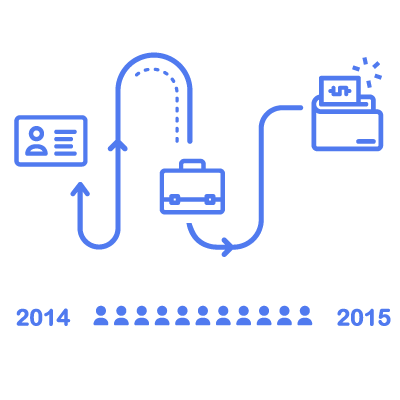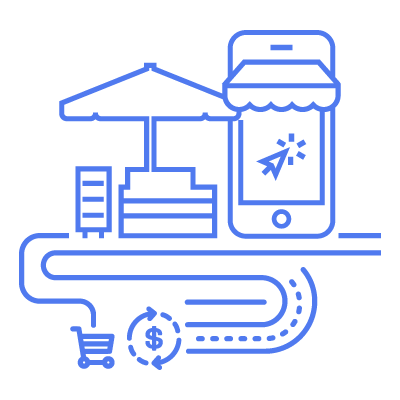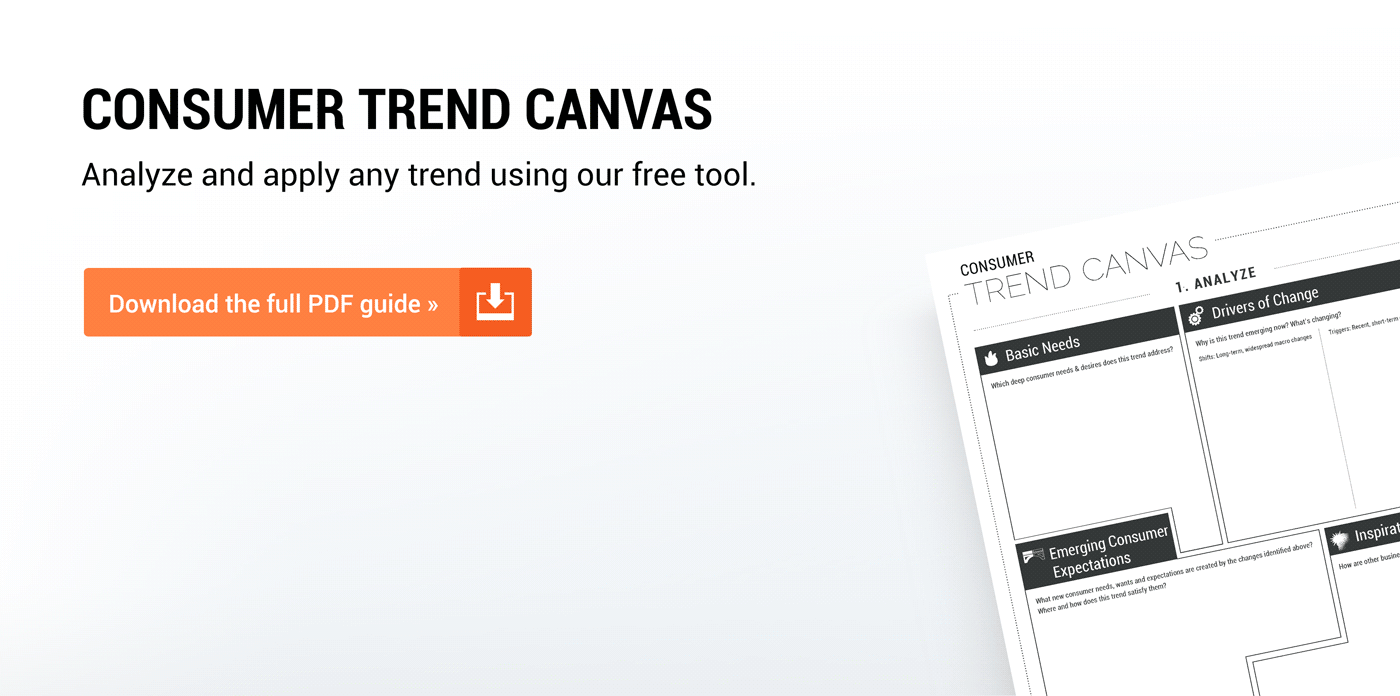P2P set consumers free. So what's next?
Shared rides to work (or anywhere). Travel liberated from McHotels and the same three guide books that everyone else has. Cheaper and faster access to diamond jewelry, garden tools and everything in-between. A truly global brain of knowledge and expertize. The revolution that is peer-to-peer buying, selling, renting and sharing is ubiquitous and thriving. But where is it all heading?
But it hasn't all been good news...
There's no denying the storm clouds gathered around the P2P rainbow. A host of unicorns that rely on networks of peer or freelance providers – yes, most notably Uber – have faced legitimate criticism around what their model means for worker welfare, rights and remuneration. Is the P2P revolution, and the gig economy it is fueling, really the universally empowering, utopian dream some have claimed?
In this Trend Briefing...
PART ONE
PEER ARMIES
The next evolution of peer power – and the smart brands and startups already riding this trend.
PART TWO
THE BIGGER PICTURE
Adding context: understand where this trend comes from.
PART THREE
WHAT’S NEXT?
Where does this trend go from here – and how can you ride it?
PEER ARMIES
The next evolution of peer power – and the smart brands and startups already riding this trend.
Awesome (peer) power. Used for good.
The epic shift that is instant access to networks of peers – and their resources, services and knowledge – is here to stay. But now people will insist it is used for good.
There are real questions around what the gig economy means for workers and the future of work.
But here’s one certainty: peer power can’t be put back in the box. Indeed, the expectations that P2P has fueled – of ultra-convenient and better value services, more authentic experiences, a constant stream of new products, and seamless selling as well as buying – will only cycle higher in the coming years. That’s what expectations do ;)
But they will converge with other, equally powerful, expectations. That P2P – indeed, that a remodeled consumerism – should make life better for all, not just a lucky few. And that everyone from big brands to plucky startups should play their part in making that happen.
New technologies. Shifting mindsets. Emerging expectations. It’s almost as though the stage is set for a new trend to emerge…
Riding high on the expectations created by P2P and gig economy superstars such as Airbnb, Uber and Instacart, consumers are now looking to all brands to help them unlock the power – that means services, resources, knowledge, and more – of their peers.
No wonder, then, that in 2016, those consumers will embrace brands that do just that, by leveraging external networks of ordinary people to create a PEER ARMY that supercharges their offering – or lets them offer something entirely new.
That could mean building a PEER ARMY out of superfans. It could mean partnering with one that already exists. Or it could mean a startup basing its entire vision around a PEER ARMY and the service it can provide.
But crucially, it means creating a reciprocal relationship, in which the rewards (money, status, a chance to show skills, a chance to do good, and more) for the peer foot soldiers are just as important as the benefits for customers.
Remember, a PEER ARMY is a mutually beneficial relationship: good for the brand, good for the ARMY, and good for customers!
1. Self-actualization becomes social-actualization
A whirlwind of expectations around a more meaningful, sustainable consumerism that EVERYONE can feel good about.
At the heart of the new expectations created by P2P lies the search for a more meaningful consumerism. Increasingly, people are searching for modes of consumption that not only make them better as individuals (self-actualization), but that also make them part of a larger, mutually beneficial collective (social-actualization).
P2P has already done much to serve those expectations: allowing people to be active participants rather than passive consumers. Letting them join networks of shared value. And by allowing for a more sustainable use of resources that is better for the planet. Once experienced, that kind of consumerism – one people can feel truly good about – is hard to leave behind.
Now, consumers will increasingly demand that brands leverage the best of P2P to serve that expectation of a positive consumerism. And that those same brands help fix less positive aspects of P2P, by building their networks on the basis of mutual benefit (see next slide for more on that).
One way for brands to respond? PEER ARMIES.
2. The disruption of work
New technologies, new mindsets, and profound social and demographic shifts are changing the world of work.
Democratized innovation, startup culture and new forms of status (not what you have, but what you contribute) means that for millions, P2P is an outlet for new expectations of authenticity and participation. Meanwhile, new technologies, business models and economic realities made work less secure for many. For some of them, P2P has been a lifeline via which they can build a new (often precarious) existence.
Both sides of the equation have fueled P2P. But now, rising numbers sense what a recent analysis confirmed: the P2P economy currently rewards those with assets (the rich) better than it does those who offer their labor, and so helps to entrench inequality (JP Morgan Chase, February 2016).
Consumers know there is no way to undo the disruption of work. But those in search of a more positive consumerism will demand new forms of P2P engagement that benefit all, not just the lucky few.
No, we’re not there yet ;) But these customer’s expectations will push P2P in all kinds of new directions – including in the direction of mutually beneficial PEER ARMIES.

The number of self-employed people in the US grew by 1 million in the year to May 2015.
US Bureau of Labor Statistics, August 2015
3. The informal economy gets organized
Ojek culture, meet smartphone culture.
It’s not only new expectations – and new necessities – around work in affluent societies that’s driving the emergence of PEER ARMIES. In emerging markets, the on-going transformation of the informal economy is helping to drive this trend.
Frequent use of informal, decentralized, cash-based services (that are also fast and relevant) is a given for hundreds of millions across emerging markets. Now, those services are being revolutionized by more widespread access to digital technologies and by the new expectations – of greater trust, more efficient access, wider choice and more – that those technologies create.
From bike delivery services to beauty therapists to street food vendors and much more, new platforms and startups are bringing independent suppliers together to form organized and accessible PEER ARMIES.
The benefits are clear on both sides. For suppliers, more customers. For customers, easier access, more choice and greater trust.

An estimated USD 10 trillion of economic activity takes place in the informal economy each year worldwide.
Professor Friedrich Schneider, leading expert on the informal economy
BUILD A PEER ARMY
One way to ride this trend? Build a PEER ARMY using your superfans, ordinary customers, users, or anyone else already engaging with you!
Airbnb
P2P accommodation site launches PEER ARMY-fueled tours
Of course, if there’s one brand we’d expect to be riding the PEER ARMIES trend it’s the masters of the P2P universe. In October 2015, Airbnb piloted Journeys, a program of handcrafted trips lasting between three and five days in San Francisco. Customers get a selected Airbnb accommodation and a range of excursions focusing on the city’s nightlife, natural wonders or food scene. Airbnb asked its San Francisco hosts to sign up as tour guides. Turning Airbnb’s accommodation suppliers into a volunteer network of city guides? That’s a PEER ARMY!
For the Airbnb user: authentic local knowledge. For the PEER ARMY: the chance to share knowledge about the city they love.
KLM
Dutch airline connects flyers on layover to locals
How about an airline leveraging a network of superfan customers to turn itself into a hospitality company? In February 2016, Dutch airline KLM announced Layover with a Local, a new initiative that matches flyers with a layover in Amsterdam with a local from the city. Flyers are put in touch with their local contact via an app, and KLM pays for the train ride to the city center and the first round of drinks. Initially, all participants must be flying between March and May 2016.
For the passenger: exciting new social connections and a free drink. For the PEER ARMY: ditto!
Chevrolet Brazil
Shoppers able to interact with Chevrolet owners via WhatsApp
August 2015 saw Chevrolet build a PEER ARMY to offer a new service to shoppers in Brazil. The brand’s ‘Real people, real opinions’ initiative invited potential customers to interact with current Chevrolet owners via WhatsApp. Upon entering the app, eleven video clips showcased a range of cars and their drivers, with each driver offering opinions about the car. A WhatsApp number allowed potential customers to chat to owners directly.
For the shopper: more honest and authentic information. For the PEER ARMY: the status of being an expert.
Visit Brussels
Tourism organization gets citizens to answer foreign tourists' questions
Here’s a PEER ARMY for travel information. In January 2016, the tourism agency Visit Brussels set up virtual telephone boxes around three locations in the city. The boxes livestreamed their surroundings to a website, which curious foreign tourists could use to call the telephone boxes. Passers-by were encouraged to answer the ringing telephone and answer questions about Brussels.
For the tourists: real, live, authentic information. For the PEER ARMY: a fun chance to display some local pride.
CoverFX
Customer selfies help users find the perfect beauty products
In August 2015, US-based cosmetics brand CoverFX marshaled a PEER ARMY to help users make better product choices. The brand encouraged customers to upload selfies to social media tagged with #showusyourshade. When users clicked on beauty products on the CoverFX website they were shown selfies of people wearing the relevant product, helping them find the color to best suit their complexion. CoverFX say that introducing selfies caused the number of people purchasing products to triple.
For the customer: more information. For the PEER ARMY: the status and the joy of sharing selfies!
Small Luxury Hotels of the World
Luxury hotel group uses guests as mystery inspectors
A PEER ARMY to test the quality of customer service? July 2015 saw UK-based luxury hotel collective Small Luxury Hotels of the World launch The Mystery Inspector program, inviting guests to play the role of quality inspectors. Guests were asked to secretly collect data during their trip and report back on the quality of their experience at the hotel, including services and facilities. Participants were refunded one-night accommodation.
For all guests: improved customer service. For the PEER ARMY: the thrill of being a mystery inspector, and one night’s stay for free.
HP Brazil
Printer owners agree to automatically print missing person posters
What about leveraging a PEER ARMY of existing customers to help make the world safer for all citizens? In May 2015, HP partnered with Brazilian NGO Mães da Sé to use privately-owned printers to disseminate information about missing persons. HP printer owners who join the scheme agreed to allow their printer to automatically print a missing persons poster when someone near their location goes missing.
For everyone: help for missing people. For the PEER ARMY: the knowledge that they are (effortlessly!) making the world a better place.
Amazon
Retailer plans to roll out P2P delivery service to more US cities
The world’s best-known online retailer builds a PEER ARMY for delivery? In December 2015, online retailer Amazon announced plans to expand its Amazon Flex delivery service to more US cities. Launched in Seattle, the Flex program allows people with no connection to the business to become independent Amazon delivery drivers, using an app to manage and schedule deliveries. According to Amazon, Flex drivers can earn between USD 18 and USD 25 an hour.
For the customer: faster delivery. For the PEER ARMY: cash!
PARTNER WITH A PEER ARMY
Another option for brands and businesses who want to leverage the power of a PEER ARMY? Partner with one that's already been built.
Correos de México and Kangou
National post service partners with P2P delivery service
How about a national public service partnering with a PEER ARMY to offer a more convenient service to customers? In November 2015, Correos de México (the national post service of Mexico), partnered with the P2P delivery startup Kangou to launch a new delivery service. Customers of the #MEXGOU service use an app to aims to arrange for Kangou couriers to collect parcels at a location of their choice; the item is then taken to the nearest post office and delivered the following day.
For everyone: a better national delivery service. For the ARMY: more regular custom and national recognition.
Marriott Hotels and VSCO
Hotel group partners with Instagram to create city guides
What about partnering with a network of amateur photographers to create a new kind of tour guides? In October 2015, Marriott Hotels partnered with photo editing app VSCO – popular with users of image sharing site Instagram – on its Travel Brilliantly series of tourist guides for cities including Berlin, Paris, Cairo and Taipei. The guides feature images from VSCO photographers paired with insider insights from expert travel writers.
For readers: more authentic travel information. For the ARMY: the status of being a published photographer.
Automakers and Didi Kuaidi
Automakers ask customers of taxi hailing app to offer test drives
Partnering with a PEER ARMY can mean offering a whole new service to your users. In November 2015, Chinese taxi hailing app Didi Kuaidi began offering its 100 million users the chance to arrange a test drive of cars from a range of manufacturers, including Toyota and Mercedes. Users can send a request for a test drive, and a nearby owner of the relevant car will deliver it. Users can complete purchase of a vehicle through the app, and can then earn cash back if they lend out their new car for test drives to other Didi Kuaidi users. In January 2016, Didi Kuaidi reported 1.4 million requests for the service in 90 days.
For all users: easier access to test drives! For the ARMY: cash back on their new car.
Ijburg Serveert and TringTring
Pop-up restaurant partners with P2P delivery service
What does it look like if two PEER ARMIES partner with each other? In September 2015, Amsterdam-based peer-to-peer pop-up restaurant Ijburg Serveert served guests home-cooked meals as part of a project to explore urban space usage. The meals, which ranged from minced lamb meatloaf to Indonesian-inspired sweet snacks, were prepared in the homes of amateur chefs and delivered to people’s homes via P2P bicycle courier service TringTring.
For the diners: authentic food, to the door! For the ARMIES: joining forces means more power and greater reach.
BE A PEER ARMY
Create a new brand, service or startup that has a PEER ARMY at its core.
Juno
New on-demand taxi service is built on idea of treating drivers better
Juno is an smartphone-fueled on-demand taxi service based in NYC. The startup says it plans to beat Uber by treating its drivers better. Juno will take only 10% of each fare, instead of the 20% or 30% that Uber takes. It will also operate a 24/7 call center for drivers, will offer 50% of its founding equity to drivers, and will let drivers choose whether they wish to be classed as employees or independent contractors. Juno is scheduled to launch in NYC in Spring 2016, and is currently paying Uber drivers in the city USD 25 a week just to keep its app open as they drive.
Mapkin
Navigation app features tips from local drivers
Mapkin is a free navigation app launched in September 2015 that centers on a community of users sharing navigations tips with one another. In order to provide directions that are easier to understand and more accurate than those from traditional navigation services, the mobile app features tips submitted by local drivers. Rather than ‘turn left in 200 yards’, for example, it might say ‘make a left after the 7-Eleven’. Developed in the US, Mapkin verifies all tips from community members.
AirDonkey
Kit facilitates P2P bike sharing
A successful Kickstarter campaign saw the launch of the AirDonkey bike rental system in Copenhagen during November 2015. People wishing to rent out their spare bicycle can purchase a EUR 100 Donkey Kit containing a smart lock, stickers, and an instruction panel to fix to the bike’s handlebars. Having registered the bike online, along with a rental price and rental zone, the owner parks the bike in a convenient public space. Others looking to rent a bike can use the AirDonkey app to locate, lock and unlock bikes. Booking and payment is completed online, with AirDonkey receiving 20% of the fee.
THE BIGGER PICTURE
To understand where this trend comes from (and where it's going) it pays to see it in the context of our Trend Framework.
The Trend Framework
16 mega-trends that provide structure and context when tracking innovation.
Our identification of the PEER ARMIES trend didn’t come via a spontaneous midnight brainstorming session ;)
Instead, as with all our trends, the process was rather more straightforward – and structured.
That’s because all the trends we spot and share are really newly-emerging directions of travel in one (or more) of our 16 mega-trends. These mega-trends are the big, slow-moving currents in the consumer arena and, taken together, they form the Trend Framework: our complete picture of consumerism today and where it’s heading.
Grab a glimpse of the Trend Framework below (clients of our Premium Service have full access).
Having a robust and comprehensive Trend Framework allows us to assess the implications of the hundreds, if not thousands, of innovations we receive from TW:IN (TrendWatching’s global network of spotters) every day. Meaning we can keep spotting and sharing great trends.










